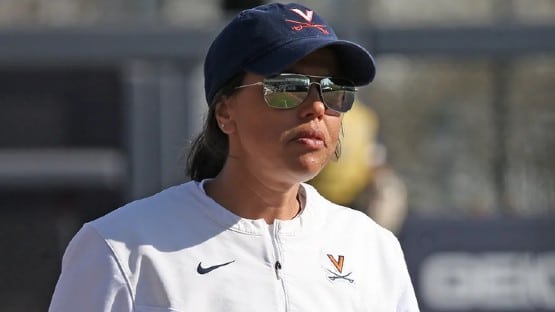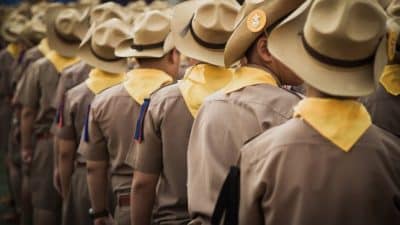
COACH LONDON: Thompson had a couple great practices, a couple weeks of really good practices. If you’ve ever had a chance to watch him, one of the things that the defensive coaches keep talking about is his good first step. He looks good wearing that number 91 out there. He’s got a long way to go.
He’s listed as a third-team guy, but that’s on base regular defense. We’re looking for opportunities to get him involved in the pass-rush situations, nickel, take out a linebacker, put in another defensive back. I think his role will increase as we go on. He’ll become a two-phase, four-phase special teams guy also.
Again, he’s another guy that has a certain set of skills that can be added to the team to help us achieve our goals.
QUESTION: The team has had a lot of success “in the trenches.” As you are building a program, how critical is that?
COACH LONDON: Well, I think for any team, the strength has to be up front on both sides of the ball, offensively and defensively. The offensive line, as I’ve said in the past, has to be and is a strength of this team. Whether it’s run blocking or providing the protection on three-step, five-step, seven-step drops for our quarterbacks. As well as the offensive line can play, then it helps the other guys, particularly the guy that’s taking the snap. It will help him play better.
I think just during the course of the game it became evident that we could throw the ball on rhythm, timing, and also run the ball. When you can do a couple different things, you don’t become one-dimensional. You can get the ball down the field, make those easy throws—those throws based on what coverages give you—have an opportunity to exploit those things. When you can run with a young man like Kevin Parks, Perry Jones, Clifton Richardson—that’s where we need to be at this point in the season. We’ll keep trying to forge an identity as we go along here.
QUESTION: Was Max Milien ever part of the fifth-year group of guys that might not have been invited back? Are you looking for him to have a larger role in the offense this year?
COACH LONDON: All the fifth-year guys outside of maybe Matt Snyder were guys I had a meeting with just to go over the expectations I had for them in the classroom, in the community, on the field. I will say Max played a lot of games last year, has done everything in the classroom—no negative issues with him off the field. I guess deep down he’s one of the guys—the type of young man that he was, the things he exhibited during the spring and over the summer—he would be one in the mix. It’s good to have an experienced guy back.
When we got into the running back situation, Max is also a tailback—not just a fullback—for the H position, so he provided a lot of positions that he could play. Him coming back was definitely high on the list.
QUESTION: Max Milien caught three passes the other day. Would you like him to have a larger role in the offense?
COACH LONDON: In a perfect world, whoever’s getting it done, whoever’s role it’s in—whether it’s Kevin Parks, Perry Jones, Clifton Richardson, the tight ends, whatever it is—whatever role they can play to help us…But the way this game played out and shaped out, we just had the ability for the safe throws, good decisions by the quarterback, and being able to run the ball.
Max did a pretty good job in the point-of-attack blocking, in the ‘I’ formation as a fullback. He’s a pretty strong guy. He’s blocking defensive ends, linebackers. That was his role for this game.
We’ll see what happens in the games that are coming up.
QUESTION: Kevin Parks had the bulk of the carries this past weekend. He had a “hot hand.” Is that a situation in which you will continue to play the running back who is hot? Is there a duel between him and Perry?
COACH LONDON: No, again, it’s the way the game unfolded. There’s two different kinds of backs, even though you look at their size. If you look at K.P. up close and personal, he’s more stout, has bigger legs—a different type of back. As you saw, we ran the power-play quite a few times. His downhill running abilities and things like that showed why he’s going to be a really good runner—a really good player—for us.
Perry, although he can run the same plays, is a get out of a zone, toss, sweep type of guy. They have different styles.
Then you have Clifton come in. He can do everything.
But I would say there are no running back issues going on right now. It’s great to have an opportunity where one, two, three and four play. Clifton Richardson and Khalek Shepherd get an opportunity to play and provide plays again. It’s more trying to find players that provide plays for us as opposed to ‘this is the guy, and we’re going to ride this guy all the way.’
This year, it’s only been one guy. As we go along, each of them do different things well, so we try to call the game according to what we think they can do.
QUESTION: You played two deep on your entire cffensive line last week. Is that something you want to do every week? Can you comment on the pass protection?
COACH LONDON: I would like to give the offensive line, particularly the second unit, opportunities to play in a game. They responded well. Matt Mihalik, Conner Davis, Cody Wallace, Kelby Johnson—a true freshman—they did a nice job. I think the comment about protecting the quarterback—with the type of throws, the game plan that Coach Lazor had early—that was important. It was important to protect the quarterback and give him the opportunity to make those throws that Michael was able to do.
We’ll continue to try to get opportunities to play as many players as we can. Because, as I said, with the 12 true freshmen then the 10 redshirt freshmen, they’re learning their opportunities now. It’s on right now. The season is going on. I made a commitment to play those guys so their learning process, their reps, their opportunities are going to have to be afforded during the next few games here.
QUESTION: Dominique Terrell and Darius Jennings both had opportunities to return kicks. Can you evaluate their performances?
COACH LONDON: They’ve been practicing that way since early camp. That was another early commitment we made outside of playing [Demetrious] Nicholson—to have those two back there catching punts and returning kickoffs.
Darius dropped the ball on first kickoff, but responded back well. With Dominique, the style of punting was end-over punts, guys being aggressive, running to get it. When the ball is going end-over, end-over, it hits the ground and there is some judgment issues there. As a first-time college game guy, I think he made some good decisions even though a couple of the balls were placed where they were. You like those nice, high spiral kicks where you can get under them. I thought he did a nice job.
You saw it with Darius on the one punt return. That’s what they’ve been doing in practice a lot of times against good-on-good coverage. We’ll continue to keep them out there, trying to find schemes or whatever it is that we can come up with to help them utilize their speed, because they are fast players with athletic ability. Coach Poindexter and [Coach] Brown are going to keep trying to find ways to use them in every aspect there is.
QUESTION: Rocco seems like a quietly confident kid. Is his soft-spokenness an issue at all?
COACH LONDON: No. If you come to practice, you listen to our snap counts. ‘Coach, why you playing all this music loud all the time?’ You have to be able to exert yourself. You have to be able to speak loud enough and clear enough. We do a lot of checking at the line of scrimmage. We do a lot of things that require the quarterbacks to speak up.
He may have a quiet demeanor off the field. I know he understands when you’re on the field, linemen need to hear you, and I think he does a pretty good job of doing that. There was, I believe, one false-start issue. That may have been because of an anticipated pass-rush situation, but it wasn’t for a lack of the guys not hearing him.
He’s one way off the field, as he presents himself publicly. On the field, I think he’s loud and clear enough to get the job done.
QUESTION: Was the play calling on Saturday night designed to not show too much and to get him off to a good start?
COACH LONDON: Probably the latter of what you just said—to get him off to a good start. There was one point where he had maybe 11 completions in a row, something like that. That’s very, very efficient. As I said before, we are a team that’s trying to find the best fit in terms of what our quarterbacks can do.
I think Coach Lazor saying, ‘All right, these are the menus of plays—based on what they show us, based on what we can do, what we’re good at—we have opportunities for. I think Michael did a great job taking what was given to him with the mindset of not trying to ask him to do too much and then executing.
Now we go into game two. We throw the ball down field more perhaps. Every team presents a different challenge. So today being a full day workday, the coaches are hard at work right now figuring out what those challenges will present for this upcoming game.
QUESTION: What did you see on Minnifield’s interception that was called back? Can you comment on the spotting of the ball?
COACH LONDON: Yeah, let me see. There’s a mechanism in place when I disagree with calls that I submit to the league office, and they review what our interpretation of what happened is and they get back to us as far as what they think happened.
The call made there was a bump. Whether the quarterback was pump-faked or had to step up in the pocket because of the rush—as long as the ball’s in his hands—I’m quite sure you can bump. But it was interpreted that the ball was in the air as the bump occurred, and it was called back.
That’s what I’ll say on that.
QUESTION: Why was the ball put on the same place?
COACH LONDON: That’s another good question.
QUESTION: Last season penalties were an issue for the team. What do you take from this game in terms of penalties?
COACH LONDON: We had eight, which is eight too many. I think two of them were holding penalties. One of the things we emphasize is having your hands inside. Pancacking a guy was one issue. One was a false start. One was defensive offsides. Then you had Chase [Minnifield]’s pass interference. Two were committed by a true freshman playing—D.J. Hill—who will be a good player. It’s very rare to see an offsides versus a kickoff, then the holding or blocking back call on a return.
You look around, and it was spread out different places. Again, the emphasis for us is to cut those down. I remember one game [last season], we had six before the half. So that’s an area we will continue to focus on. We’re much better at it than we were before. Part of the growing pains of a young player is him understanding what his role is in blocking angles. Like I said, we have an opportunity to keep practicing, keep emphasizing the way we want to play the game.
QUESTION: What were you trying to accomplish with the play selection for David Watford, and what do you feel you accomplished?
COACH LONDON: Some of the things we wanted him to do was to handle the ball—whether it was a quarterback read play, some safe handoffs, some things like that. They did a good job of defending him on two of the plays that we specialized for him.
He’ll probably admit he had early play jitters. Here it is, first college game, and you’re on the 20-yard line. I believe that’s when we put him in. He’ll admit to you that’s kind of what happened.
But I think as the game went on, he made a couple really nice throws—one to Darius Jennings and another one going in toward the big scoreboard on a sprint-out. He let a rusher pass him, set his feet, threw the ball. Those are the type of things that we’ll continue to keep doing with David. As he gets comfortable with the offense, we’ll do more things. We’ll just keep bringing him along because, again, I believe he’ll be a pretty good player for us.
QUESTION: After not winning any games away from Charlottesville last season, the team now faces two straight road games. Was there a common thread in those losses?
COACH LONDON: No, I just think that on a given Saturday, teams played better than us. They executed better than us. One of the main focuses of this season, both offensively and defensively, was to execute our offense, defense or special teams in the manner and style that we play.
I’m very pleased with the defensive effort. I think [William & Mary] didn’t cross the 50-yard line until the last drive. I’ve never been in a college football game where that’s happened. There were some really good things out there that they did.
So pat yourself on the back. Now we’re going to play a team that’s known for being physical—tought—in a physically rugged league. We’re going to have to ask for the same type of effort from everybody again—even to play better—to eliminate the things when you look at the film that we have to correct going into playing their first home game, our first away game.
But I don’t think it was anything more than other teams were better than us on that Saturday and they executed better. So now we have to do a much better job to turn that around.
QUESTION: What can you tell us about Indiana’s offense, defense, special teams?
COACH LONDON: Look at the conference they’re in, who they play. I don’t know if they’re on the Legends or Leaders side. But they’re big and they’re physical. Kevin Wilson, the head coach there, came from Oklahoma. He has some ties to Northwestern. Their offense is a little bit of a pistol offense with the back directly behind the quarterback. It’s a high-tempo offense where they don’t allow you to substitute, so they’ll get to the line of scrimmage quickly, check at the line, and call their plays. There’s a little bit of option aspects to what they do—some two-back schemes there. There’s some quarterback read plays.
It’s an offense I know that made Northwestern and Oklahoma successful. I think Coach Wilson has brought that to them and is trying to get that implemented.
Defensively, they use multiple fronts—4-3, also a 3-3. We’ll see something almost like a 50-front—center-up, defensive ends, walk one of their D-line men off the ball, put him in the bubble, run stunts with him and blitzes and things like that. I know they have a linebacker—Thompson, I believe—who’s the second leading tackle on the team. He’s a very rugged player, good player.
On special teams, their field goal kicker kicked a 49-yard field goal this past game. Their freshman wide receiver is also a kickoff returner…returned a 29 yarder in this week’s game.
They’re a young team like us. You look at their two-deep, you look at their roster, you watch the film, you see a lot of true freshmen playing for them also. So I would see two teams that are very similar in having youngsters providing depth and hopefully putting the balls in their hand to make plays happen.
I would imagine this is their first home game and they’re anxious to get back going on track here. We’re excited about the challenge that’s presented to us in our first away game. What kind of team are we? How can we play on the road? How can we get better, improving from the first game to this game?
QUESTION: Michael Rocco mentioned that one of Indiana’s biggest strengths was stopping the run. Do you anticipate using the passing game more against the Hoosiers?
COACH LONDON: Well, I think what happened in the game that they played against Ball State was indicative of the style that Ball State had. I played against Coach Lembo when he was at Elon. Even though they’re spread out, it’s kind of a power running game for them. As you watched the game go on, Ball State did a good job of controlling the tempo by running inside zone, by attacking the perimeter, and also by doing some play-action pass things—all the things that Coach Lembo did when he was at Elon.
We’re a similar type of team. Our style of play is similar to that. As I said, with Sunday and Monday being the kind of the days where you really try to dissect what a team is doing, we dictate the game plan on what we think we can do, watching what Ball State did. We follow some of the history of some of the new coaches they have, where they’ve been before. Some have been at Purdue. I believe one of the offensive coaches was on Coach Reid’s staff at Richmond.
There’s a lot of research going on right now with the guys, with the staff. Then there’s coming up with a game plan. The attack plan for this game will probably come this evening, and we’ll start practicing tomorrow morning.
QUESTION: With such a young team, do you approach this week any differently with regard to preparation?
COACH LONDON: I don’t know about approaching it differently. I do know that when we’re at home, our guys don’t stay in their dorms. They stay somewhere close by. It’s a businesslike approach even in that regard.
But I think the fact of traveling, staying in a hotel, going to a different city… the game is at 7:00, so it’s very similar to this past week. The pregame meal and all the things like that—it will be a repeat of that.
There are enough veterans on the team to provide leadership in regard to how we handle ourselves, how we conduct ourselves, how we travel, those things.
But the meetings—how we’ll meet, all that—will stay constant and will stay the same. The variable now is that I don’t know what the weather will be like. It’s a night game. It’s their first home game. People will be yelling and screaming and booing, those type of things.
Again, it goes back to pre-camp—trying to do as much as you can with the noise or the music or whatever it might be. But again, until you play in the game, you can’t simulate those things. Until you play an away game—have crowd noise, playing with different officials, just all those different things—you won’t know till you start playing. But hopefully we’ll be prepared.
QUESTION: Any injury updates on Colter Phillips and Austin Pasztor?
COACH LONDON: Austin is fine. I think he played 50 something snaps. He’s good to go. Colter had his lower leg injury. I think he’ll be fine. If you remember, his brother plays at Indiana. I wouldn’t even try to keep him off the plane to go play in this game. This game means a lot to him and his family. So I would expect Colter to be there.
QUESTION: Obviously this was just the first game of the season, but what have you seen thus far in terms of energy and confidence?
COACH LONDON: Well, what you see is a level of confidence in some of the younger players. Their high school accomplishments speak to the fact that they’re district champions, state champions, high school All-Americans, players of the year. There’s a temperament, and there’s a ‘we can do’ kind of belief.
Like I said, none of our seniors have had an opportunity to do anything post-season. There’s just a common thread being run. Listen, we’re going to take one game at a time. What we can control right now is this game, how we execute, how we play. I think there’s always, when you first come in, a young guy playing over an older guy. You look at it, it’s like, ‘I’ve been here for a while, I should be playing.’ But I think the type of team that we have—young guy, old guy—that guy is getting the job done. Whether the younger guy or the older guy can get it done, the entire team reaps the benefit of someone’s production.
I think that’s the difference right now with this team, even being just one game into it. But I’d say we have a better team in terms of how our players deal with each other and how they’ve accepted and embraced some young guys and how some young guys have reached out to some older guys for advice and for being those type of models and things like that.
I think we have a better team. The chemistry inside the team is much better.
QUESTION: People look to the quarterback as a leader, but there are captains helping him. Is this year’s surrounding cast important?
COACH LONDON: I think that’s part of it. Whoever the quarterback was or is, I think the surrounding cast is going to make that position. Being able to block run-wise if they’re playing with a down safety to stop the run…then when it’s time to throw the ball, the offensive line has to provide protection, to open it back up where they have to play with two safeties and go seven-man box. It’s elementary. But as elementary as it sounds you have to be efficient and you have to execute.
Where we are with this team now, the quarterback position has to rely on others doing their jobs at a higher level. I think with the development of those guys during the season, we’ll start to see guys kind of emerge, whether it’s Michael [Rocco], David [Watford], or Ross [Metheny], because there’s confidence. Confidence is gained through playing, making those tough throws, those decisions that you make.
Game one in the books now and on to game two.
QUESTION: You’ve been doing this for 25 years, how often during your career have your teams had morning practices during the season? What kind of logistical issues do you have to go through to pull that off?
COACH LONDON: I’ve been to a couple places where we have practiced early in the morning. After hearing from a bunch of coaching friends, I know Miami coach [Al] Golden does the same thing. He was having early morning practices at Temple.
I think logistically it doesn’t provide that many problems because we’re the only ones up most of the time. What it does provide is an opportunity for the players to take the majority of the classes. I kind of did some research. After 11:00 on a Monday, Wednesday, Friday, there are maybe 700 to 800 classes. On Tuesdays and Thursdays, there are almost 1,000. The numbers on Monday, Wednesday, Friday at 8:00 or 9:00 are 250, and Tuesdays and Thursdays maybe about 300. You say, ‘What are you talking about, London?’
I’m talking about the opportunity for these guys to have success in picking courses that fit their major, taking courses that they are excited about, taking courses that are afforded to them. Having success in the classroom, I think, will lead to them feeling better about themselves. Feeling good about themselves will translate to having success on the field. That’s just my personal belief. So that was the biggest reason.
QUESTION: Have you ever done it before?
COACH LONDON: Done it a couple places in the mornings during spring practice, but no, not during the season.
I think if you ask our guys right now, they like it. We’re done practicing 10:15. That’s it—they’re done for the day. Any academic obligations—anything they have on a Tuesday, Wednesday, Thursday, study hall, all those things—we’re on top of them. If you want to hang out at night, late at night, knowing you have to get up early in the morning—you want to perform and hold your position with somebody else looking to compete at that position—more power to you.
QUESTION: Have you heard any griping from recruits?
COACH LONDON: Not really, not when you talk about the benefits of it. Our players can speak to the benefits of it. We talked about it with our captains before coming out of spring practice that this is what we were going to do. At first it was like, ‘Hmm.’ But when you’re up that early, you’ve had breakfast. The first thing you do is go to your first class. Guys are sitting in the front. There are just so many different things you can do when you’re alert and you’re aware. Whether it’s the recruits or the players, if you can keep talking about the benefits of it—about the class selection—that’s a huge, huge benefit. We’ll continue to do that as long as everybody’s on board with it.










